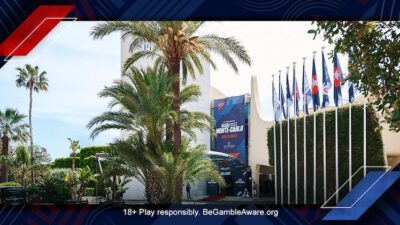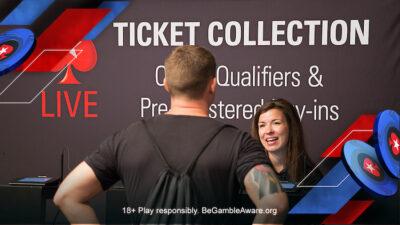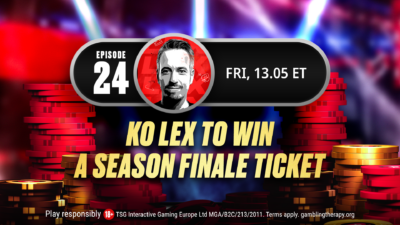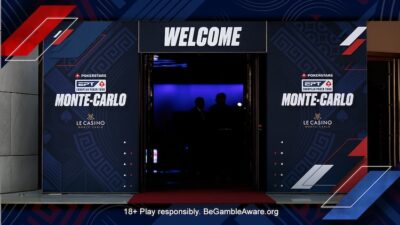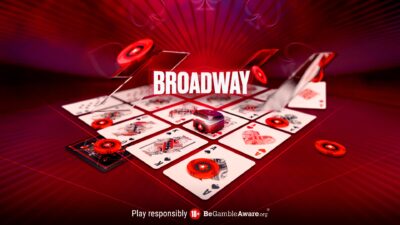“When you sit down at a poker tournament, what’s your intention?”
It’s Q&A time once again in the Player’s Lounge here at the PokerStars Caribbean Adventure, and Team PokerStars Pro Daniel Negreanu has taken the stage. But in this particular instance, he’s asking the question of the audience. The responses come flying back: “To win”, “To cash”, “To play well”. All good, honest answers.
Daniel Negreanu: One of the big things when you play a tournament is to be clear in what you’re actually trying to accomplish, whether that’s to cash, or to win, or whatever. Then when you’re actually playing the tournament you need to ask yourself, are your actions in line with your stated intention?
For me, I noticed that 10 or 12 years ago, I’d say that I wanted to win the tournament, but the night before I’d be out having drinks at the bar ’til 4:30am, get five hours sleep, and show up an hour and a half late. My actions weren’t matching my intention.
And how about now? How have your intentions changed?
DN: I’ve been a big goal-setter my whole life. Every January I write out 10 poker goals for the year. They’re often lofty and people laugh at me, but one of my goals this year is to win three WSOP bracelets.
I wouldn’t bet $1,000,000 even-money that I’ll do that, but it’s what I want to accomplish and I believe that I can, so I’m setting that goal. Of course, if I win two, or one, that’s not going to suck, but I’m a believer in setting goals slightly higher than you think may be reachable.
Kid Poker holding court
Honesty, self-awareness and emotional intelligence are clearly key when trying to pin down what your intentions are at the poker table. Once you’ve realised where you want to get to, how do you go about getting there?
DN: Design a plan based on your stated intention. A few years ago, my intention was to get back to within the top 15 on the Global Poker Index – I was at around 100 at the time – so I made a three-month plan where I did the following:
I watched video, two nights a week, on pokerstars.tv. Watching the high rollers, watching my opponents play. On Tuesday nights, for one hour, I would speak to players I respect and think of 3-4 hands to discuss with them. I practised on Friday and Saturday nights by playing two five-hour sessions. And I thought a lot about the game.
So I had a weekly plan, within my three-month plan to get to the top 15. I’d write it out every Sunday night. At the end of that three months, I’d expanded my poker thinking and knowledge base, and I might not have done that if I didn’t have that plan.
If you really want to get better, and that’s your true intention, it’s going to require you to put in some work. It doesn’t just happen.
You can do anything, but stay offa those blue suede shoes
Once you’ve defined your intention and thought about your plan, what else can you do to realise your ambitions?
DN: Stand by your results. The thing about bad beat stories is, there’s no value in them. Why do people tell bad beat stories? So they can say, ‘It’s not me, I’m just unlucky!’ They can get off the hook by not being responsible for their results. They’ll tell you about losing all-in with kings. You ask, how many big blinds did you have? They say, ‘seven’. Well, how did you get down to seven? ‘Oh, you know, let’s not talk about that part…’
You may know a player called Mike Matusow. He’s the most unlucky player in the world – just ask him. There are situations where he’s running bad, in his mind, and for example a flush card comes on the river. I’ll bet really big, because Matusow will be thinking, ‘Well of course he has the flush! I’m the unluckiest player in the world, so every time I flop top set, they hit the flush!’ He’s not even thinking about the fundamentals of the hand anymore. When you tell bad beat stories and give off that image, that you’re a victim, people are going to take advantage of you.
About four or five years ago I was in love with a woman and she broke my heart. It not only affected my confidence in my everyday life, but had a massive effect on my poker game. I’d tell people the stories; she did this, she cheated on me, she lied to me and so on. But that’s the victim version. The responsible version is…when I met her, she was kinda seeing somebody else!
She lied to me, but I chose to stay. It was 100% my choice. Once I realised that, I could let go of it.
What differences have you noticed between online players and live players?
DN: There’s certainly a difference. If you’re an online grinder, typically one of your strengths is going to be short-stack play, playing 20 BBs or less. They’re going to push a lot more than a live player, they don’t see as much play available. A live player, playing 90-minute levels, will look at 15 big blinds and think, ‘I have a little wiggle room’. But in an online tournament, if they’re looking at 15 bigs…boom – ship it. The mentality’s different.
One question that arises in live play that you don’t need to think about online is, how do you think you come across? If you’re sitting with someone dressed conservatively, like an older business guy, are you going to think he’s a wild one? We profile people, and you can use that to your advantage. In live poker it doesn’t matter what your image is, you can exploit it.
When someone is wearing a hoodie, scarf and sunglasses, what does that say about who they are? When I see somebody who’s hiding like that, they’re trying to avoid giving off tells, because they’re afraid. So I often pick on them even more, because I know that they’re uncomfortable and I want them to play differently than they would normally.
Of course, you could always play it the other way. There was a guy – not so popular anymore – called Chris Ferguson. He was a math genius, but he’d wear this cowboy hat, long beard, long hair, and looked kinda like a country bumpkin, hiding the fact that he’s this math guy.
Negreanu: not really a hoodie & shades kind of guy
What do you think about taking notes at the table?
DN: I used to take a lot of notes when I first started, always on key hands. I don’t really do that anymore because I can remember them much better, but it can definitely be valuable. If you start taking notes on key hands, you’ll start to see patterns, and that could help you identify flaws in your game. And of course these days you can make notes and post them on forums – ‘I played this hand, what do you guys think?’
I also highly recommend having a network of friends, players who you trust and respect, that you can talk to about hands. There’s immense value in seeing different ways of thinking about poker.
Years ago there was myself, John Juanda, Allen Cunningham, and this guy called Phil Ivey. We’d play a tournament, and afterwards we’d go to dinner and discuss hands. So, for example, Phil would describe a hand – if he lost the pot John would always tell him he played it wrong – and I would see if I agreed with the way Phil played it (I usually did). Then Allen would tell us the right answer!
***
Listening to Kid Poker talk about his favourite subject, it’s clear that he’s lost none of the enthusiasm for the game, nor for the constant improvement required to stay ahead of the pack. Given the turnout for his Q&A session today – and the line of people that queue up at the end for an autograph and photo – it’s also clear that the public have lost none of their enthusiasm for Daniel Negreanu.
For even more advice from the winningest player in tournament poker, check out the video below:
Follow all the action from the PokerStars Caribbean Adventure on PokerStars Blog. Everything from the Main Event is on the Main Event page and check out reports from here on the PokerStars blog as well. Follow the live stream, too, at EPT Live.
Adam Hampton is a copywriter for PokerStars
Back to Top


